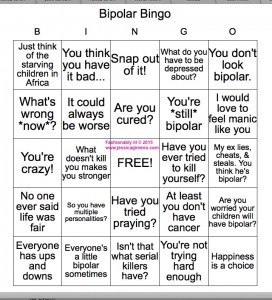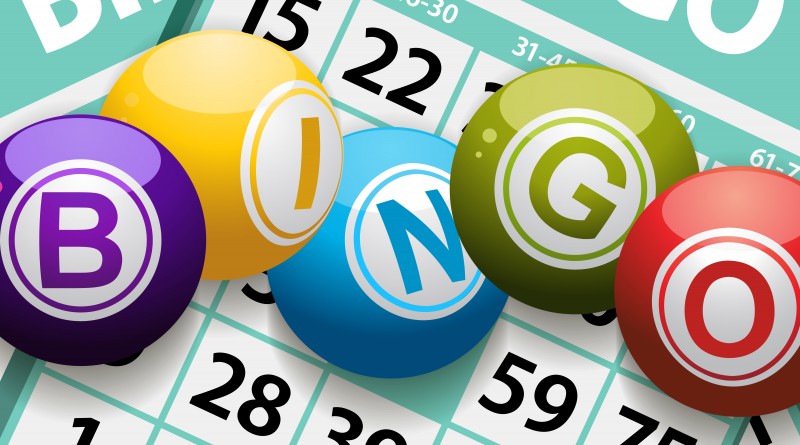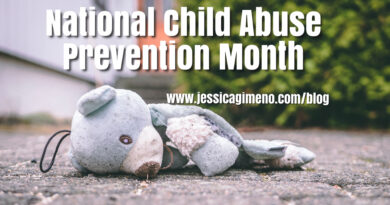Bipolar Bingo: 24 Things *Not* To Say to People Who Have Bipolar Disorder
Coming out of the mental illness closet (or sadly, in some cases being outed) is very hard. I surveyed Fashionably ill ® readers and they shared what their least favorite expressions and stereotypes are. On this Bipolar Bingo Card (pass the chips and play with friends!), there are 24 things not to say. My personal favorites include: “Everyone’s a little bipolar,” “Isn’t that what serial killers have?” and “You’re still bipolar?” I’ve also included a short video of me discussing Bipolar Bingo that you can watch here: https://youtu.be/KCZrHWRN47A

Fashionably ill Readers And I Talk About Bipolar Disorder Misconceptions
The reason I personally don’t like “everyone is a little bipolar sometimes” is because bipolar disorder is more than changing your mind or feeling temporarily sad. It’s not like last month when I told myself I would watch the Bulls game and changed my mind at the last minute and watched How To Get Away With Murder instead. Having bipolar disorder sometimes means I feel lonely out of the blue when I’m having a good day and am surrounded by people I love. It’s fighting to be productive despite sporadic episodes of depression. I’ve heard people sometimes assume people with bipolar are lazy as if we use this illness as an excuse not to work. Nothing could be further from the truth. Managing bipolar disorder like my other four illnesses (which are not mental illnesses) is hard work that involves work like seeing my therapist, taking prescribed meds, doing mood charts, and exercising. On our Facebook page, several Fashionably ill readers shared similar sentiments like Joseph and Rudy.
JOSEPH, “This is the difference between someone who is sad about their circumstances and someone with a condition that at times is disabling. Positivity is not a cure.”
RUDY, “For me it would be that I can just get out of bed shake it off and cure myself through sheer positivity…As if I never considered getting out of bed or finishing school. It’s insulting to my intelligence.”
The other saying that gets me is “happiness is a choice.” That would be like telling someone who is having an asthma attack, “breathing is a choice.” (I say this as someone who has asthma, by the way.) As I previously blogged about, I think telling people who are depressed (or have other diseases–not just mental illness), “Just think of the starving children in Africa” is insensitive. Similarly, it would be insensitive of me to tell a (healthy) friend who just lost his job or suffered a breakup, “At least you don’t have bipolar disorder.”
Other Fashionably ill readers like Meghan and Kim discussed how people sometimes stereotype people with bipolar as manipulative and violent even though only 4% of all violent crimes are committed by people with mental illness.
MEGHAN, “Top three for me are: 1. usually mass shooters and other criminals are labeled bipolar (not always true) and then actual people with bipolar are said to be potential criminals as well.
2. The term ‘manipulative’ is thrown around all too much with this diagnosis (and bpd, borderline personality disorder)
3. People idealize mania. Yes sometimes great things can come from it however it comes at great costs”KIM, “ I was misdiagnosed with this, and people jumped to conclusions. Assuming I would transform from making muffins to serial killing with no apparent reason…It seems to frighten people. And when you have an actual reason to be upset, and not even showing symptoms of going off the handle, they again jump to conclusions, and ask if your meds aren’t working. Like people who suffer from this, are the scapegoat for bad behavior. People with bipolar are not really allowed to “react” to a real situation (being justifiably upset at a coworker who does not do his/her share of the work, for example), without it becoming the reason for the problem. If a bad thing happens to a person with mental disorders, people don’t compare their reaction to that of a normal person in the same circumstance. People immediately make assumptions, about medication, or whatever…Then I was properly diagnosed, and the stigma stayed with me.”
As I’ve previously blogged about, suicide prevention IS important to me. After all, I have bipolar disorder, lost a friend to suicide, and have worked in mental health nonprofit. However, when I’ve just come out to someone as having bipolar, I don’t like automatically hearing, “Have you ever tried to kill yourself?” That’s like meeting a war veteran for the first time and asking, “Have you ever killed someone?” Uncomfortable. Occasionally, strangers will ask me what’s wrong after seeing my cane. When I tell them (sometimes I say I have an “illness” and other times, I tell them I have myasthenia gravis, MG), they respond, “Oh my gosh! That’s terrible. How long do you have to live?” I don’t like people responding to my bipolar and MG diagnoses by asking if I’ve ever tried to kill myself or if I’m going to die soon, respectively.
Some People Want To Know What We’re Going Through
There are people who really do mean well but they are not sure what to say.
KATE, “I don’t know much about bipolar disorder and that’s why I hope that when people get those questions, they take a minute to educate the person. Often people don’t mean to be offensive with questions like that–they just honestly have no idea.”
Your Turn
What misconceptions of mental illness have you experienced? For more on my journey navigating bipolar disorder, you can watch my TEDx Talk here.
–Your Stylist, Jessica Gimeno



